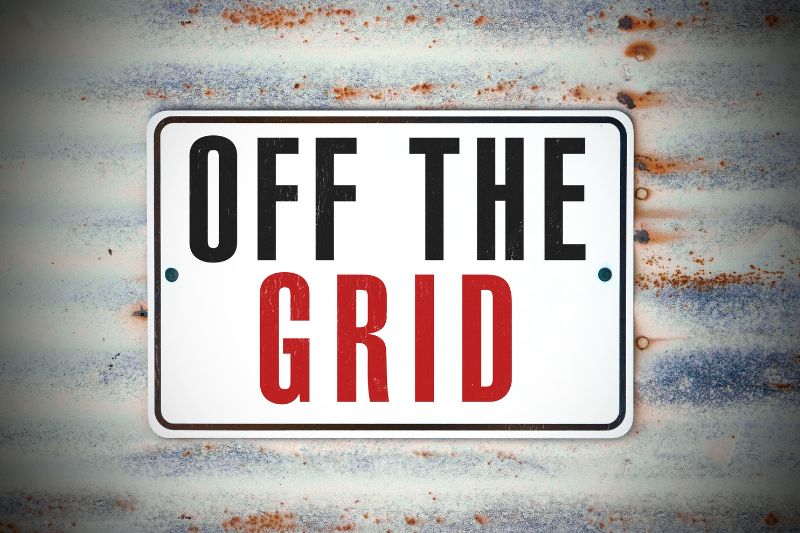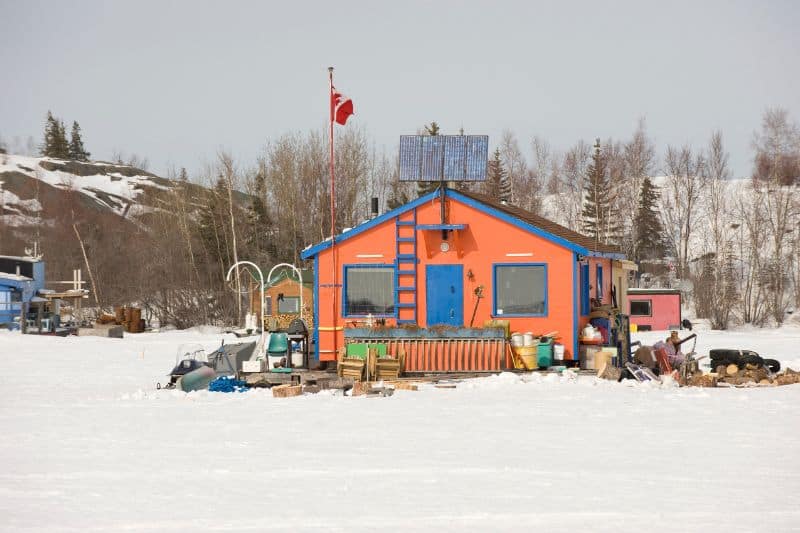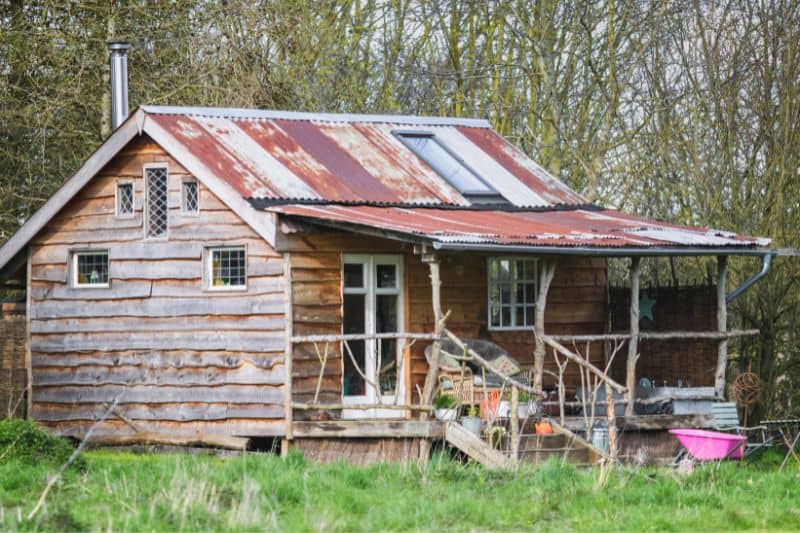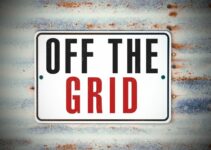Are you planning to take a break from the bustling city life? Do you want ample time to connect with nature away from the noise and pollution?
Going off-grid is a great idea. It provides a way to disconnect from the modern world, giving you the serenity and peace of mind you crave.
But before you plunge into the endeavor, get your facts right! Know the highs and lows that come with off-grid life and how you can skillfully navigate them like a pro on your first attempt.
Read: 10+ Unlimited Luxuries That You Can Have When You Go Off-Grid
Let’s dive in!
What is Going Off-grid?
Just before we dive into our nitty-gritty for the day, how about beginning with addressing the basics?
What exactly do we mean when we say off-grid life?
Well, in simple terms, it’s exactly what it says — a life away from the grid.
In other words, when you go off-grid, you cut off all connections with modern utilities and amenities. This include things like electricity, gas, water supply, internet services, and the list goes on and on.
It’s much like going back in time to the simpler way of living that existed before most of what we now have was invented. It involves relying on natural resources and your own skills to survive away from cities where there’s little to no pollution.
20+ Things You Should Know Before Going Off-Grid
Going off-grid may sound like a dreamy adventure. But before you embrace it, I’ll be honest with you: there’s more to it than what meets the eye.
Here are 20+ important things you should know before packing your bags and heading into the wild:
1. Sorry, But It’s Not As Easy as It Looks
Don’t get me wrong. I’m not trying to discourage you from going off-grid. But it’s important to know that living off-grid comes with its own set of challenges. It requires hard work, dedication, and a lot of patience.
So, if you’re used to soft life, off-grid life may come as a shock to your system. But don’t worry, the rewards of living off-grid are worth all the effort.
2. Your Research Determines Everything Else
Before you embark on the off-grid journey, take your time to research. The location you choose will define the resources available to you and the challenges you may face.
Check to see if there are any local off-grid communities and reach out to them for advice and support.

3. Solar Power isn’t Complicated, After All!
Many people shy away from going off-grid because they think solar power is complicated.
But that’s not the case.
The truth is, with the advancements in technology, solar power has become more accessible and affordable. And remember to correctly size your solar panels depending on the amount of power you need.
4. Maintenance-free Batteries Are the Way To Go
Batteries are an essential part of your off-grid system and require proper maintenance. The sun only shines for a few hours each day, and you need enough battery storage to last through the night.
Consider investing in high-quality batteries to make your life easier. And remember, if you don’t want to deal with regular maintenance, opt for maintenance-free batteries like lithium-ion or nickel-iron.
5. You’re Literally Heading To the Zoo
Well, this may sound a bit scary but that’s the case. When you pack for an off-grid life, you’re literally heading to the wild. So, don’t be astonished when you stumble upon a deer at your doorstep or find a snake slithering around your camp.
But don’t worry, they fear you more than you fear them. Just be cautious and respectful of the wildlife, and they’ll coexist with you peacefully. And, of course, ensure that you research animal populations and potential hazards in your chosen off-grid location.
6. Firewood Can Be a Real Hassle
When you go off-grid, you simply lose access to your well-furnished contemporary kitchen. It means instead of flipping a switch to boil water or cook a meal, you have to gather your firewood and start a fire.
And let me just prepare you for this: it can be a real hassle, especially during the colder months. So, make sure to set up your firewood storage area close to your shelter and always have enough backup wood.
7. You’re More Than What You Probably Think
Off-grid life is not just about disconnecting from modern amenities. It’s also about connecting with nature and honing new skills.
You’ll learn to appreciate the beauty of nature and develop a deeper understanding and respect for it. And you’ll also discover skills within yourself that you never knew existed, such as gardening, hunting, or carpentry.
8. Wildlife Love Trash
Perhaps you’ve one day woken up to see raccoons around your trash bin. Well, that’s just a glimpse of what you’ll experience when living off-grid.
Generally, animals are attracted to trash, so make sure to properly store and dispose of your waste to avoid unwanted visitors.

9. Insulation is Crucial For Temporary Shelters
Once you’re out there, temperatures can really become extreme. There are times it can become scorching hot or freezing cold depending on where and when you go off-grid.
Hence, be ready to work with natural materials like straw bales, grass, or mud to insulate your shelter. Also, consider investing in a good sleeping bag and warm clothing for the colder nights.
10. There’s No One Way To Go Off-Grid
Off-grid living is not a one-size-fits-all situation. Every individual has their unique preferences and needs when it comes to off-grid life. In other words, what worked perfectly for someone else may not create similar results in your scenario.
So, even as you read this guide, you must not stick to everything we say. Get creative to make your life out really count. Sometimes it’s okay to veer off the path of the majority and explore what works best for you.
11. Even High-Quality Batteries Can Run Out
Remember, even with a well-designed solar power system, some days will turn out cloudy, and this could mean that your batteries running out. You might want to think about carrying along a generator or having a backup power source just in case.
12. You Need a Plan For Your Number 2
Yeah, let’s get real here. Going off-grid means you’re leaving behind the luxury of modern plumbing and toilets.
So, factor in how you’ll manage human waste. Is it through composting toilets or digging latrines? Get answers to these questions beforehand.
13. You’re Your Own ‘Garbage Man’ Out There
It might not look like it, but off-grid life also produces a big deal of waste. And, of course, you’re your own “garbage man”, so factor out a waste management plan before you dive into your off-grid life.
It’s definitely a challenge to live off-grid and maintain an eco-friendly lifestyle. But with proper planning and effort, it can be done. Consider composting, recycling, and reducing waste in your daily routines to minimize your impact on the environment.
14. Weather Will Dictate Your Schedule
Living off-grid means that your daily routine will depend largely on the weather. You’ll need to take advantage of sunny days to charge your batteries and do outdoor activities, while rainy or stormy days may limit your options. Be prepared to be flexible and adapt to changing weather conditions.
15. First Aid Kit is Indispensable
You can’t afford to be careless with your health when living off-grid. Be sure to have a well-stocked first aid kit for any emergencies that may arise, as medical help may not be readily available in remote off-grid locations.
16. You Need Your ToolKit
Living off-grid requires you to be self-sufficient and able to handle basic repairs and maintenance. A toolkit with essential tools like hammers, screwdrivers, and pliers will come in handy for any DIY projects or fixes.
17. Basic Navigation Skills are Needed
Without access to modern technology like GPS, you’ll need to rely on basic navigation skills such as using a map and compass to find your way around. These skills are also crucial if you plan on exploring the surrounding wilderness.
18. Water Pipes are Underrated
In a traditional home, water pipes may not be given much thought. But when you’re off-grid and you have to carry your own water, you’ll quickly realize the value of having a good plumbing system.
Implement rainwater harvesting methods or find other ways of obtaining water to elude the hassle. For instance, you can dig your own well, especially if the water level is high in the area you choose to settle.

19. Get Ready For Loud Silence
Living off-grid means getting away from the hustle and bustle of modern life and immersing yourself in nature. Be prepared for moments of complete silence, broken only by the sounds of wildlife and the occasional gust of wind. It may take some getting used to, but it can also be a peaceful and rejuvenating experience.
20. Adaptability is a Survival Strategy
Off-grid living is all about being adaptable to changing circumstances and challenges. You’ll have to learn to think on your feet, problem-solve, and adjust your plans as needed. This flexibility is crucial for surviving and thriving in an off-grid lifestyle.
21. Shower Moments Can Be Tricky
Let’s face it, showering may not be as simple as turning on a faucet when you’re off-grid. Depending on your setup, you may have to collect rainwater or heat up water on a stove to have a hot shower.
It may take some extra effort, but the feeling of a warm shower after a long day off-grid is worth it. Always have a plan for how you’ll get clean while living off-grid.
22. Pay Attention To Your Furry Friends
If you plan on bringing your furry friends along for off-grid living, don’t forget to consider their needs as well. They’ll need food, water, shelter, and of course, protection from wildlife. Make sure to research the specific challenges and precautions needed for keeping pets in an off-grid environment.
Read: 20+ Things That You Shouldn’t Buy as an Environmentalist
23. Most Items Are More Versatile Than You Thought
Who in their contemporary lifestyle would have thought aluminum foil can be a good pot scrubber? What about using a knife to start a fire or an empty can as a makeshift lantern?
Living off-grid often ushers you into a realm of creative thinking and you can find alternative uses for everyday items. Keep an open mind and be resourceful, you’ll be surprised at how versatile some common household items can be in off-grid living.

